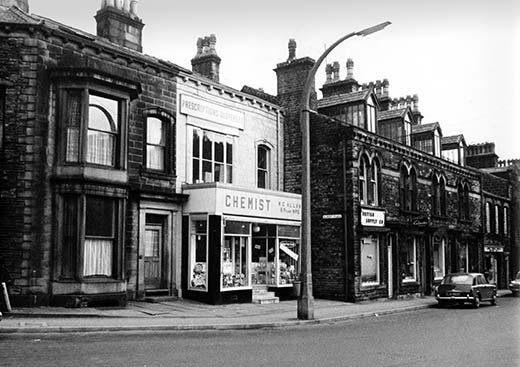History Society Report
Memories from Hebden Bridge Pharmacies
Speaker: Linda Powell
Wednesday, 4 October 2017
The apothecary’s bottles, jars and scales on display at the season’s first meeting of Hebden Bridge Local History Society seemed redolent of an ancient craft; in fact they were an essential part of the working life of long time Society member Linda Powell, who began her career in the Co-op Pharmacy in Hebden Bridge in the 1960s. Her engaging memories of the times brought home to the audience the extent of changes we have seen in medical practice and social norms since then.

The Co-op Pharmacy, in Albert Street, was an essential part of community life for the busy industrial town, and run at that time by a Mr Tom Barker, always formally dressed and partial to a spot of rum with his morning coffee. In the shop fitted out with fine oak cupboards and counters, Linda learned her craft, which involved making up the ointments, liniments, medicines and suppositories prescribed by the doctors. Ingredients were weighed out precisely, ground up to powder with a mortar and pestle, and shaken up with water in half gallon bottles, before being poured into the correct size prescription bottle. Local chemists also had their own bottles of tinctures for coughs and colds, which in winter could swell their profits. Among the abbreviated Latin instructions scrawled on the doctors’ prescriptions, might be found ADT – ‘any damn thing’ – which was a signal to provide some convincing potion for a troublesome hypochondriac.
Other medicines regularly sold over the counter, included Beechams powders and pills, and Fennings Fever Cure along with traditional recipes such as camphorated oil for bad chests and gentian violet for impetigo. Constipation was another area of profitability for pharmacists, with sackfuls of senna pods held in stock to be sold in small bags. More alarmingly, farmers would also arrive with an order for strychnine, to rid their fields of moles.
Over the years these in-house remedies disappeared, with the arrival of new drugs made on an industrial scale and dispensed in their packaging, although senna pods survived for a long time. The pharmacy remained an essential resource providing pregnancy and blood pressure tests, advice and reassurance along with the prescriptions. The familiar and friendly faces of Linda and her colleagues keep the pharmacy at the heart of the community. This fascinating talk gave us an insight into their changing roles.
The next meeting of Hebden Bridge Local History Society is at Hebden Bridge Methodist Church on Wednesday 11th October at 7.30, when, in a change to the programme, Barbara Rudman will take us on a Todmorden Old Pub Trail. All welcome.
Details of all the Society’s activities can be found on the website and you can also follow us on our Facebook page.
With thanks to Sheila Graham for this report
See also


